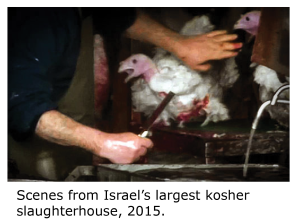Reform the Scandal-Prone Kosher Meat Industry? Let’s Get Real.
Here we go again.
Two years after Israeli animal-rights investigators filmed shocking abuses of chickens and turkeys at the Soglowek kosher-meat plant, equally egregious practices were caught on film again this summer.
In a well-intentioned op-ed published in Ha’aretz on July 16, rabbinical student Ayalon Eliach observed that “the gulf between the purpose of keeping kosher and the practice of keeping kosher is now greater than ever.”
That’s an understatement.
But an even greater gulf – one of tragically enormous proportions – has emerged between the core Jewish principal of tza’ar baalei chayim and the practices of the kosher-meat industry.
It’s not just the morally repugnant practices we’ve observed in undercover videos shot in the largest kosher slaughterhouses, whether its Soglowek in Israel or Agriprocessors in the United States.
It’s the fact that the kosher-meat companies obtain virtually all of their animals from the same factory farms that serve the secular meat industry. And you thought kosher meat was more humane?
The Torah mandate of tza’ar baalei chayim forbids Jews from inflicting unnecessary suffering on an animal. Indeed, the Torah – both the Five Books of Moses and the Torah writ large – expresses exquisite sensitivity to the needs and natures of animals.
Yet unnecessary suffering is universal in factory farms, the source of more than 95 percent of our meat.
In the beef industry, cows are typically branded, castrated and dehorned, all without anesthetic. And, in the dairy industry, mother cows are permanently separated from their calves just hours after birth, causing extreme emotional distress for parent and child alike, all so that the farmer can monetize all the milk.
Chickens in the poultry industry have it worst of all. They are generally crammed into windowless warehouses, in which as many as 50,000 chickens are given an average of less than one square foot of space apiece. These are breeding grounds for disease, as we have seen this year in the U.S., where a bird-flu epidemic has resulted in the loss of almost 50 million birds.
And this is just scratching the surface of the tip of the iceberg. How’s that for an effective mixed metaphor?
All of these practices – which are the standard modus operandi of modern animal agriculture – constitute egregious violations of tza’ar baalei chayim. This is exactly why many leading rabbis now say that no meat can truly be considered kosher.
 For instance, in a recent interview, former Chief Rabbi of Ireland David Rosen identified himself as a vegan and said:
For instance, in a recent interview, former Chief Rabbi of Ireland David Rosen identified himself as a vegan and said:
“Anybody with eyes in their head can see that (factory farming) is a categorical transgression and desecration of the prohibition on causing cruelty to animals.”
Last time The Beet-Eating Heeb checked, most people do have eyes in their head.
To expound on Rabbi Rosen’s statement:
In Jewish thought, we are not allowed to fulfill a mitzvah by committing an averah, a sin. Hence, even if the laws of kosher slaughter are scrupulously observed, the meat cannot be kosher if tza’ar baalei chayim was violated along the supply chain.
Simply put, kosher-meat companies are subsidizing the infliction of unnecessary suffering, every time they purchase another animal from a factory farm.
Why is this allowed to continue?
Could it be because the kosher-meat companies are a significant source of revenue for the Orthodox community, both through kosher-certification fees and through corporate philanthropy?
BEH commends Mr. Eliach for calling for reforms in the kosher establishment. However, such calls for change have been made and heard many times before, with little effect. The industry and its rabbinic allies are highly resistant to reform.
Fortunately, there is a practical solution within our reach – and it’s found in the Torah, and in the teachings of many of our greatest rabbis.
The solution is to wean ourselves off meat, dairy and eggs altogether and to move toward a vegan diet.
The Godly ideal of a plant-based diet is set forth in Genesis 1:29 and reinforced in passages across all five books of the Torah.
As Rav Avraham Kook, the chief Ashkenazic rabbi of pre-state Israel, so eloquently stated in his book “A Vision of Vegetarianism and Peace”:
“The failure to heed the good and noble instinct to refrain from taking any form of life, whether for one’s needs or physical gratification, constitutes a moral lack in the human race.”
Another understatement.
Posted on July 23, 2015, in Factory Farming / Animal Cruelty, Torah/Bible and Veganism and tagged Beet-Eating Heeb, Kashrut, kosher, Soglowek, Torah, vegan, Veganism. Bookmark the permalink. 3 Comments.


Animal-based diets not only violate tsa’ar ba’alei chaim, but also Jewish teachings on preserving human health, protecting the environment, conserving natural resources, and helping hungry people.
Thank you many times for this. Eloquently and well-argued. Also well-timed for Tish Ab`v, let us mourn and come together with renewed energy for the fight against these transgressions. We are all harmed in the process of harming animals. With love and appreciation, Leah (in Japan)
Date: Thu, 23 Jul 2015 11:19:23 +0000 To: leambystomamexicanum@live.com
Great article. Kol hakavod to the Beet Eating Heeb. I hope the article will be widely read and acted upon and that many people will share it with their local rabbis, Jewish educators and other influential Jews.
What makes the widespread horrendous treatment of farmed animals even more shameful is that the consumption of meat contributes significantly to heart disease, cancer, and other major diseases and the production of meat is a major contributor to climate change, soil erosion, deforestation, an other environmental threats.